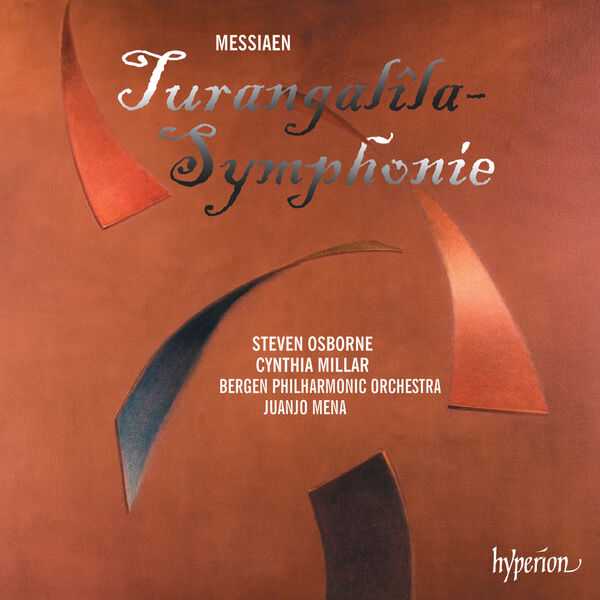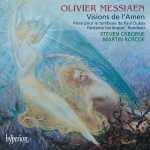
Composer: Olivier Eugène Prosper Charles Messiaen
Performer: Steven Osborne, Cynthia Millar
Orchestra: Bergen Philharmonic Orchestra
Conductor: Juanjo Mena
Format: FLAC (tracks)
Label: Hyperion
Catalogue: CDA67816
Release: 2012
Size: 315 MB
Recovery: +3%
Scan: yes
Turangalîla Symphony
01. I. Introduction
02. II. Chant d’amour 1
03. III. Turangalîla 1
04. IV. Chant d’amour 2
05. V. Joie du sang des étoiles
06. VI. Jardin du sommeil d’amour
07. VII. Turangalîla 2
08. VIII. Développement de l’amour
09. IX. Turangalîla 3
10. X. Final
‘The Messiaen Monster’, ridiculed by critics at its premiere—in the best tradition of works of genius—is now ‘established as one of the most astonishing classics of the twentieth century’, as Nigel Simeone writes in the booklet of this brilliant new release. The joyful generosity of the orchestral writing and kaleidoscopic nature of the musical invention make Turangalîla one of Messiaen’s most characteristic and appealing works, considered by many to be his masterpiece. As well as the distinctive sound of the ondes martenot, the other striking feature is the virtuoso piano part—it is in some ways a concerto, although the sheer scale of the orchestral contribution belies that specific title. Rarely has it been more explosively performed than here, with an acknowledged living master of Messiaen’s piano music, Steven Osborne, at the keyboard.
Juanjo Mena leads the Bergen Philharmonic Orchestra in a crisply precise reading of Messiaen’s massive Turangalîla-Symphonie, and Hyperion’s engineers capture that precision with gleaming brilliance and exceptional detail. It’s reasonable to question, though, whether Turangalîla-Symphonie is a piece that fares best in such an immaculate performance. The symphony is notable for many things, including its length, number of movements, formal organization, and exotic instrumentation, but not least for its emotional wildness, kinetic volatility, and explosive, sometimes messy exuberance. These last are characteristics that Mena has to sacrifice to some extent to achieve this clean, controlled performance, which is absolutely faithful to the letter of the score but that sometimes misses its spirit. The Bergen Philharmonic Orchestra plays with the chops of a world-class orchestra, with remarkable technical facility and gorgeous tone, especially in the strings. This is certainly a performance that Messiaen fans will want to hear because the details are so beautifully clear that it’s possible to hear little felicities of orchestration that can easily get buried in other versions. The composer extravagantly praised the 1991 Deutsche Grammophon version with Myung-Whun Chung leading Orchestre de la Bastille, and its easy hear why; it’s an unusually organic conception of the symphony, especially in moments like the frenzied juxtapositions of the first movement and the searing passion of the Liebestod-like section of the eighth movement. The earlier recording is certainly more thrilling, but it doesn’t have the acoustical brilliance of this one. Mena is most successful in the sixth movement, “Jardin du sommeil d’amour” (Garden of the Sleep of Love). Here, the clarity of the spare orchestral textures and the prominent independence of the piano create a transcendently serene stasis, where time really does seem to lose its meaning.
The recording puts pianist Steven Osborne and ondes martenot player Cynthia Millar in the foreground in its acoustics. The piano stands out with the prominence of a concerto soloist, and while that is a possible interpretation of the composer’s intention, it is more pronounced here than in most recordings. Osborne does play the dazzling piano part brilliantly and Millar is similarly virtuosic in a performance that also pops out above the orchestra and highlights the strangeness of the instrument’s timbres.



